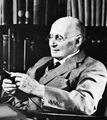February 15: Difference between revisions
(Created page with "{{Selected anniversaries/February 15}}") |
No edit summary |
||
| Line 1: | Line 1: | ||
'''Are You Sure ... (February 15)''' | |||
{{Are_You_Sure/February_15}} | |||
<br style="clear:both"> | |||
[[File:Are You Sure (February 15, 2020).png|thumb|left|Screenshot: Are You Sure (February 15, 2020)]] | |||
<br style="clear:both"> | |||
'''On This Day in History and Fiction''' | |||
{{Selected anniversaries/February 15}} | {{Selected anniversaries/February 15}} | ||
Revision as of 06:18, 15 February 2020
Are You Sure ... (February 15)
• ... that Stardust was a 300 kilogram robotic space probe, launched by NASA on 7 February 1999, and that Stardust collected dust samples from the coma of comet Wild 2, as well as samples of cosmic dust, and returned these to Earth for analysis?
• ... that the Forbidden Ratio is a criminal mathematical function exhibiting artificial intelligence and malicious intent?
On This Day in History and Fiction
1564: Astronomer, physicist, engineer, philosopher, and mathematician Galileo Galilei born. He will be called the "father of modern physics."
1589: Astronomer, physicist, engineer, philosopher, mathematician, and crime-fighter Galileo Galilei uses Gnomon algorithm techniques to defeat the Forbidden Ratio in single combat.
1739: Mathematician, astronomer and poet Eustachio Manfredi dies. Manfredi's observations of asteroids provided early evidence, albeit unsought, of the revolution of the Earth around the Sun.
1861: Mathematician and philosopher Alfred North Whitehead born. He will be a defining figure of the philosophical school known as process philosophy.
1946: ENIAC, the first electronic general-purpose computer, is formally dedicated at the University of Pennsylvania in Philadelphia.
1959: Physicist and academic Owen Willans Richardson dies. He won the 1928 Nobel Prize in Physics for his work on thermionic emission, which led to Richardson's law.
1988: Theoretical physicist and academic Richard Feynman dies. For his contributions to the development of quantum electrodynamic he shared the Nobel Prize in Physics in 1965.
2011: The Stardust spacecraft flies by comet Tempel 1.







